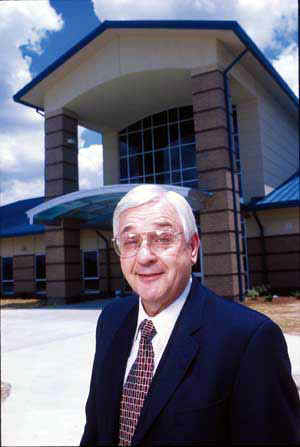 Community
Profile Community
Profile
Right: Superintendent Jim Causby says the opening of
West Johnston High School (rear) is evidence of growth and progress
Schools Raise Academic Goals
While Also Raising New Buildings
The
year was 1989 and Johnston County had a problem. Its school system
included 15 three-story buildings, all of which had been classified as
“Category 5” — very poor condition — by the state Department
of Insurance. Citizens, concerned that learning could not be maximized
in buildings that were falling apart, directed the county’s board of
education and commissioners to do something about school facilities.
A plan emerged: outdated buildings could be replaced, classrooms would
be added, existing buildings would be upgraded and new schools would
be constructed to accommodate growth. Funding would come from local
and state bond referendums, secured funds through COPS (Certificates
of Participation) and other state school construction monies. Finally,
a citizens’ advisory council offered input about the massive
project, most significantly requesting model elementary and middle
schools whose designs could be used several times to reduce
architectural and construction costs.
By the end of 2001 the problem that prompted the whole “brick by
brick” program had been reduced by 80 percent. Twelve of the 15
Category 5 buildings were gone, having been replaced entirely. But the
biggest achievement may have been the arrival in 1993 of James F.
Causby as county school superintendent. Prior to his arrival,
countywide bond issues had not passed for the previous 30 years. Since
1994, however, some $300 million has been put in place for facilities.
Timing, as the saying goes, is everything. Causby, an experienced and
nationally recognized school administrator, brought a needed set of
skills to a rural county on the verge of obliterating all growth
records. In fact, statistics show that Johnston County is now the
fastest growing county with the fastest growing school system in the
state, with about 1,100 new students being added each year. The import
of those facts has not been lost on its residents.
During the 2001-02 school year, the 31 public schools in the county
served approximately 23,000 students in grades K-12. Between 1989 and
the spring of 2002, 26 of the school buildings were either entirely
new construction, received new classroom wings, media centers,
cafeterias and the like, or renovations to targeted areas such as
heating, ventilating or air conditioning systems.
Two more brand new schools, Four Oaks Middle in Four Oaks (cost: $10.7
million) and West Johnston High in Benson (cost: $32 million), are
scheduled to open this month. And next February, Selma Elementary’s
$12.6 million new construction/renovation project will be complete.
Don’t think, however, that the school system hasn’t been watching
its pennies.
“For many reasons, but especially given the aggressiveness of the
construction program, cost containment has been a high priority,”
Causby says. “Using prototype buildings for elementary, middle, and
high schools allows us to negotiate with a contractor who’s familiar
with the program. What this means is, we are able to build schools
today for less than we did when we first started.”
While the progress and its blueprint are commendable, no one, not
Causby, members of the school board or commissioners, is ready to rest
on their laurels. They know what’s coming. The best estimate is that
by the 2010-11 school year, the school system’s enrollment will top
36,000.
They are justifiably proud, though, of the gains the district has made
and that in charting a new course for the system and its facilities
they have modeled many of the “ethical principles” that have been
incorporated into the curriculum: dependability, honesty, integrity,
perseverance, respect and responsibility. — Lisa H. Towle
Return
to magazine index
|
|

